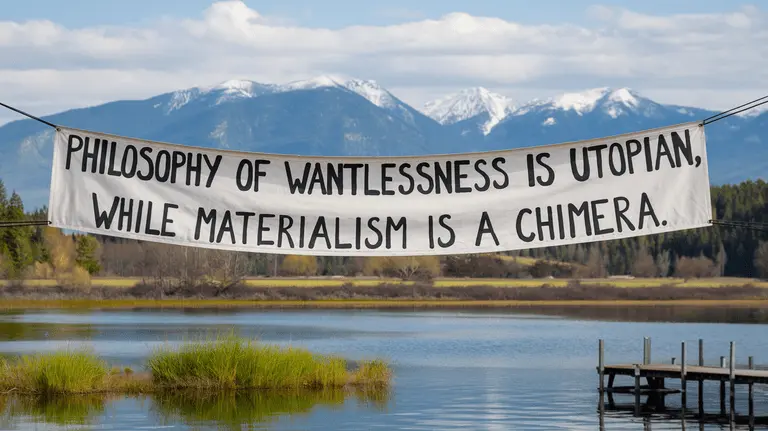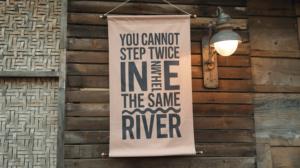The statement “The philosophy of wantlessness is Utopian, while materialism is a chimera” presents two contrasting views on life—one idealistic and unattainable, and the other an illusion that people chase in vain. The philosophy of wantlessness suggests a state where desires are eliminated, leading to inner peace and fulfillment. This idea is often seen in spiritual teachings like Buddhism, where detachment from material possessions and desires is the key to enlightenment. However, such a state of absolute wantlessness is often considered Utopian, as human nature is inherently driven by desires. On the other hand, materialism, the constant pursuit of material wealth and possessions, is likened to a chimera—an illusion that promises fulfillment but ultimately leaves people unsatisfied and empty. This essay explores the balance between these two opposing ideas and how they shape human behavior, society, and personal fulfillment.
Introduction
Humans have always been caught in a tension between spiritual ideals and material pursuits. The philosophy of wantlessness represents a vision of life free from desire, where true contentment comes from within. However, this ideal is often seen as impractical in a world where desires drive progress, innovation, and personal ambition. On the other hand, materialism offers a path to fulfillment through the acquisition of wealth and possessions, but it often proves to be a never-ending chase, where satisfaction is always just out of reach. This essay delves into the paradox of these two philosophies and examines whether balance can be achieved between the pursuit of inner peace and material success.
Wantlessness as a Utopian Ideal
The philosophy of wantlessness is rooted in ancient spiritual traditions, particularly in Eastern religions like Buddhism and Hinduism. In these traditions, the ultimate goal is to detach from desires, which are seen as the source of suffering. The idea is that by letting go of attachments to material things, wealth, and even relationships, one can achieve a state of inner peace and enlightenment.
However, this ideal of complete wantlessness is often viewed as Utopian—a perfect but unattainable goal. Human nature is driven by desires, whether they are for basic needs like food and shelter or higher aspirations like success, love, and recognition. Desires push people to work harder, innovate, and improve their circumstances. To eliminate desire entirely would mean to suppress the very force that drives human progress and survival.
For most people, the idea of living without any desires seems unrealistic. While it is possible to moderate one’s wants and practice detachment, achieving a state of absolute wantlessness is extraordinarily difficult, especially in a world that constantly presents new opportunities, challenges, and distractions. Thus, the philosophy of wantlessness, while noble, often remains more of an ideal to strive for than a practical way of living for the majority.
Materialism as a Chimera
On the opposite end of the spectrum lies materialism—the belief that happiness and fulfillment come from the accumulation of wealth and possessions. In today’s consumer-driven society, material success is often equated with personal success. People are encouraged to pursue wealth, luxury, and status, believing that these things will bring them happiness and satisfaction.
However, materialism is often described as a chimera—an illusion or a mirage that people chase but never fully attain. The more wealth and possessions one accumulates, the more one desires. The pursuit of material wealth often leads to a sense of emptiness, as the satisfaction gained from acquiring new possessions is fleeting. Soon after obtaining one material goal, another emerges, leading to a never-ending cycle of desire and consumption.
This cycle of wanting more and more often leads to feelings of dissatisfaction and even despair. The material world can never fully satisfy deeper human needs for love, connection, and purpose. The illusion that material wealth can bring lasting happiness is what makes materialism a chimera—an unattainable and deceptive goal.
The Balance Between Wantlessness and Materialism
While wantlessness may be Utopian and materialism a chimera, there is a middle ground between these two extremes. The key to a fulfilling life may lie in finding a balance between detachment from excessive desires and the practical need to pursue material goals. In this balanced approach, individuals can enjoy material comforts and success while remaining mindful of the deeper, non-material aspects of life that bring true contentment.
Practicing moderation in desires can lead to a more grounded and meaningful life. By being aware of the fleeting nature of material possessions and focusing on personal growth, relationships, and inner peace, individuals can enjoy the benefits of both worlds. Material wealth can provide comfort and security, but it should not be the sole focus of life. At the same time, striving for wantlessness can help reduce stress, anxiety, and the constant pursuit of more, leading to a more content and peaceful state of mind.
Conclusion
The philosophy of wantlessness and the pursuit of materialism represent two contrasting views of life—one focused on inner peace and detachment from desire, and the other driven by the accumulation of wealth and possessions. While wantlessness may seem Utopian and materialism a deceptive chimera, the key to fulfillment may lie in balancing these opposing forces. By moderating our desires and recognizing the limitations of material wealth, we can lead more meaningful, balanced, and satisfying lives. In the end, the journey of self-awareness, contentment, and purpose involves navigating between these two extremes and finding harmony within ourselves.
Read More: Nearly all men can stand adversity, but to test the character, give him power







